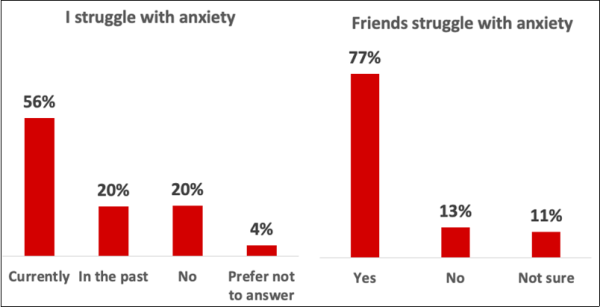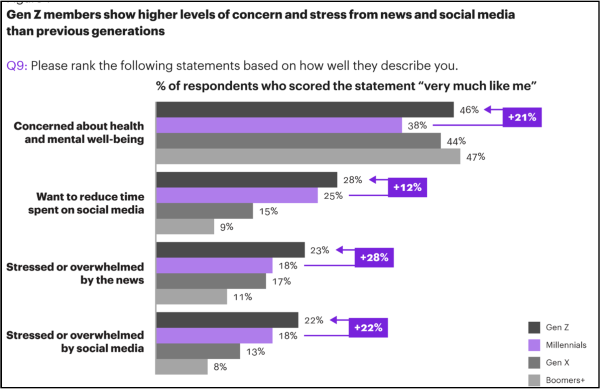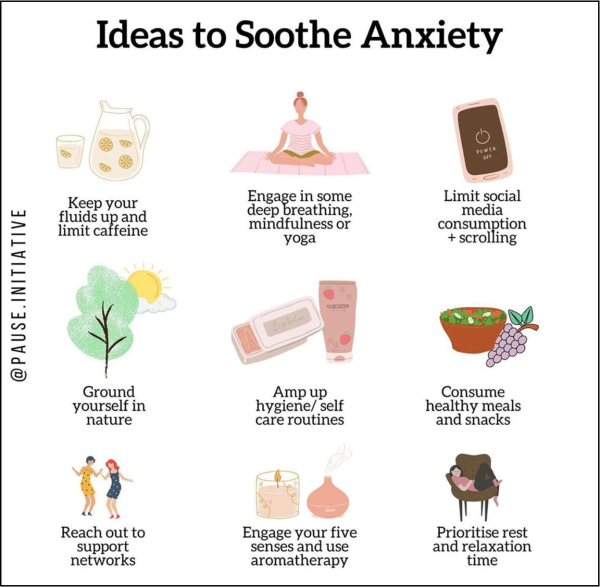Over 60 percent of Gen Z has been diagnosed

with anxiety, according to the National Social Anxiety Center, thus being deemed as “the anxious generation.” More than 40 percent of Gen Z state they struggle with depression, according to MSU Denver Red. These two stats combined have become the reason some go as far to say people born between 1997-2012 are “the loneliest generation,” but why is this?
There are many factors, but a likely culprit is technology. This generation grew up with information at their fingertips more than any other before it. In past generations, the only way to consume news was by watching television or reading the local newspaper, so many were living unaware of the constant global horrors. Nowadays, devastating stories and images are posted instantly, allowing younger generations to have constant access to the worst aspects of human nature. Whether it’s climate change, mass shootings, or even economic issues, the world seems rather grim and unexciting to a young mind that just absorbs information
Another aspect of this increased exposure is social media. While social media can be a useful communication tool, it also comes with additional pressure. Likes, follows, and shares add to the want to be seen as the best. Influencers show the most positive sides of their lives, ignoring anything negative; as a viewer this makes one believe that they are not good enough or that their life just isn’t the same.
Ella Hendry, a senior at MHS agreed. “Seeing people our age doing so many things with their lives makes us feel like we are behind.” Some strive for the highest numbers while showing off their vacations or the best photos they have.
Fellow MHS senior Catherine Wittman concurred stating, “they’re more available for everyone, which leads to higher pressures on individuals from the competition on social media.” Social media leads to an unspoken competition with others and a strong pressure to be up to date with the most recent trends.
The newest trends go with the intense nee

d to fit in: to know the slang, have the most recent clothes, accessories or whatever is the newest craze. Societal pressure is a direct cause of anxiety; the constant worry of how Gen Z is perceived by their peers leads to a strong worry and panic.
The psychology term The Spotlight Effect, which describes the common feeling that everyone is focused on you, describes the phenomenon well. This is a common feeling for teenagers of any generation, but it seems to have a heavier impact on Gen Z; this may tie to the desire of seeming perfect on social media, and therefore real life as well.
While the anxiety may have always been around for Gen Z, the effects of the COVID 19 pandemic did not help. The average Gen Z kid was only 16 years-old, a sophomore in high school when social interaction is most crucial for development, when the world shut down, For those even younger, the effects were much worse. Wittman stated, “COVID contributed to the unfamiliarity of being in social situations.” This led to a stronger dependence on social media for social interaction and also a game of catch up for maturity of those who were younger.
Hendry continued, “people learned to rely on being by themselves…so we lost some of the social skills that are developed during your early teenage years.” This led to a fear of interaction when the process of back to “normal” life occurred as the idea now seemed scary since before this wasn’t a worry and could be easily avoided if wanted.
MHS senior Mackenzie Anderson similarly said, “many of us have become dependent on social media and almost disconnected from the real world…it can inhibit us from fostering relationships and creating true connection.” Anderson also stated that the dependence on social media could easily be a strong factor for anxiety within Gen Z.
Another reason for the younger half is that school isn’t as easy as it was for previous generations. The programs taught are much more rigorous, and as some top tier colleges become more and more selective, each grade matters all the more.
“Our generation has been moving life at a faster pace,” Anderson added. “It feels as if every teen has their nights filled with jobs, sports, homework, volunteering, hanging out with family, and responsibilities at home.”
Similarly Wittman expressed, “honors or advanced consideration, or once was advanced, is now the norm, which creates higher expectations for students and our generation.”
All of this builds up at a young age into immense pressure at the high-school level. Each grade, AP class, sport, extracurricular are all just college application builders.
“We hold ourselves to such high levels of success and panic when that pressure begins to weigh on our shoulders,” stated Hendry. There becomes an expectation to plan out your whole future by 18 which makes college so much scarier with what comes after.
For the older half of Gen Z who are in college or have graduated the main worry is not having enough money to live comfortably, according to McCrindle.org. 65 percent are mainly focused on their future finances, but to make a high salary often comes with a price.
Fewer students want to go into something that they will love, so they can instead focus on having good finances even at the price of their joy. 61 percent of respondents fear not enjoying their future career. The two fears strongly contradict, which adds even more panic over the decision. So now there’s a new question: what’s more important; happiness without money or money without happiness?
So there are many reasons why Generation Z has been given their title of “The Anxious Generation:” technology, worldly fears, social anxiety, the effects of COVID, social pressures, expectations, and financial pressures.
While there is no doubt students are stressed, there are many ways to cope with anxiety and live a healthier, happier life. The Mayo Clinic points out that simple steps like prioritizing times for exercise, eating healthier and staying on a strict sleep schedule can have positive mental health benefits. Writing in a journal, limiting social media and even spending time outdoors can also relieve symptoms. Most importantly, students need to learn how to confront the sources of their stress.
“It is human nature to want to avoid the source of the anxiety,” said MHS Counselor Gina Pryor. “However, taking small steps to address struggles can help to reduce anxiety triggers over time.” Pryor recommended practicing breathing exercises mindfulness techniques, such as the 5-4-3-2-1 grounding technique.
She also encouraged any students who are experiencing anxiety to attend an upcoming mindfulness session held during Seminar on Jan. 15th. For more information or if you are looking for additional help, please contact Student Services. Students should also check out the story on meditation strategies on Page A2.
with anxiety, according to the National Social Anxiety Center, thus being deemed as “the anxious generation.” More than 40 percent of Gen Z state they struggle with depression, according to MSU Denver Red. These two stats combined have become the reason some go as far to say people born between 1997-2012 are “the loneliest generation,” but why is this?
There are many factors, but a likely culprit is technology. This generation grew up with information at their fingertips more than any other before it. In past generations, the only way to consume news was by watching television or reading the local newspaper, so many were living unaware of the constant global horrors. Nowadays, devastating stories and images are posted instantly, allowing younger generations to have constant access to the worst aspects of human nature. Whether it’s climate change, mass shootings, or even economic issues, the world seems rather grim and unexciting to a young mind that just absorbs information
Another aspect of this increased exposure is social media. While social media can be a useful communication tool, it also comes with additional pressure. Likes, follows, and shares add to the want to be seen as the best. Influencers show the most positive sides of their lives, ignoring anything negative; as a viewer this makes one believe that they are not good enough or that their life just isn’t the same.
Ella Hendry, a senior at MHS agreed. “Seeing people our age doing so many things with their lives makes us feel like we are behind.” Some strive for the highest numbers while showing off their vacations or the best photos they have.
Fellow MHS senior Catherine Wittman concurred stating, “they’re more available for everyone, which leads to higher pressures on individuals from the competition on social media.” Social media leads to an unspoken competition with others and a strong pressure to be up to date with the most recent trends.
The newest trends go with the intense need to fit in: to know the slang, have the most recent clothes, accessories or whatever is the newest craze. Societal pressure is a direct cause of anxiety; the constant worry of how Gen Z is perceived by their peers leads to a strong worry and panic.
The psychology term The Spotlight Effect, which describes the common feeling that everyone is focused on you, describes the phenomenon well. This is a common feeling for teenagers of any generation, but it seems to have a heavier impact on Gen Z; this may tie to the desire of seeming perfect on social media, and therefore real life as well.
While the anxiety may have always been around for Gen Z, the effects of the COVID 19 pandemic did not help. The average Gen Z kid was only 16 years-old, a sophomore in high school when social interaction is most crucial for development, when the world shut down, For those even younger, the effects were much worse. Wittman stated, “COVID contributed to the unfamiliarity of being in social situations.” This led to a stronger dependence on social media for social interaction and also a game of catch up for maturity of those who were younger.
Hendry continued, “people learned to rely on being by themselves…so we lost some of the social skills that are developed during your early teenage years.” This led to a fear of interaction when the process of back to “normal” life occurred as the idea now seemed scary since before this wasn’t a worry and could be easily avoided if wanted.
MHS senior Mackenzie Anderson similarly said, “many of us have become dependent on social media and almost disconnected from the real world…it can inhibit us from fostering relationships and creating true connection.” Anderson also stated that the dependence on social media could easily be a strong factor for anxiety within Gen Z.
Another reason for the younger half is that school isn’t as easy as it was for previous generations. The programs taught are much more rigorous, and as some top tier colleges become more and more selective, each grade matters all the more.
“Our generation has been moving life at a faster pace,” Anderson added. “It feels as if every teen has their nights filled with jobs, sports, homework, volunteering, hanging out with family, and responsibilities at home.”
Similarly Wittman expressed, “honors or advanced consideration, or once was advanced, is now the norm, which creates higher expectations for students and our generation.”
All of this builds up at a young age into immense pressure at the high-school level. Each grade, AP class, sport, extracurricular are all just college application builders.
“We hold ourselves to such high levels of success and panic when that pressure begins to weigh on our shoulders,” stated Hendry. There becomes an expectation to plan out your whole future by 18 which makes college so much scarier with what comes after.
For the older half of Gen Z who are in college or have graduated the main worry is not having enough money to live comfortably, according to McCrindle.org. 65 percent are mainly focused on their future finances, but to make a high salary often comes with a price.
Fewer students want to go into something that they will love, so they can instead focus on having good finances even at the price of their joy. 61 percent of respondents fear not enjoying their future career. The two fears strongly contradict, which adds even more panic over the decision. So now there’s a new question: what’s more important; happiness without money or money without happiness?
So there are many reasons why Generation Z has been given their title of “The Anxious Generation:” technology, worldly fears, social anxiety, the effects of COVID, social pressures, expectations, and financial pressures.
While there is no doubt students are stressed, there are many ways to cope with anxiety and live a healthier, happier life. The Mayo Clinic points out that simple steps like prioritizing times for exercise, eating healthier and staying on a strict sleep schedule can have positive mental health benefits. Writing in a journal, limiting social media and even spending time outdoors can also relieve symptoms. Most importantly, students need to learn how to confront the sources of their stress.

“It is human nature to want to avoid the source of the anxiety,” said MHS Counselor Gina Pryor. “However, taking small steps to address struggles can help to reduce anxiety triggers over time.” Pryor recommended practicing breathing exercises mindfulness techniques, such as the 5-4-3-2-1 grounding technique.
She also encouraged any students who are experiencing anxiety to attend an upcoming mindfulness session held during Seminar on Jan. 15th. For more information or if you are looking for additional help, please contact Student Services. Students should also check out the story on meditation strategies on Page A2.